#magic items that build on your backstory
Explore tagged Tumblr posts
Text
Things like this always make me think of the two artefact swords in the Shannara series and the story differences between them.
The Sword of Shannara is a mythic weapon that had an entire prequel book dedicated to its creation. It was specifically designed as a weapon against one particular foe, and First King of Shannara’s whole plot is the quest to successfully forge this weapon. Which, pretty cool, yes.
The Sword of Leah, on the other hand, was the purely mundane ancestral sword of the Leah family, the family of hotheaded roguish allies who spend most of the original trilogy following various Shannaras/Ohmsfords through adventures. It was made magical purely because Rone Leah, Wishsong of Shannara’s generation of the Leahs, chose to backtalk Allanon, the series main quest-giver and magical powerhouse, at exactly the wrong moment, and Allanon forged magic into the blade in a fit of pure pique, scaring about sixteen years off Rone’s lifespan in the process. (Alannon made him hold the blade in the lake of death and seared the death-water into the blade with his own fire magic, and a seven foot tall absolutely livid druid grabbing your weapon and shoving it into the death portal lake with you attached is an intimidating thing to happen to a dude). And because it was forged in a fit of pique, the sword has some side-effects later on. It eats magic, so it’s extremely useful when fighting magic enemies, but it’s also addictive and not entirely stable.
And I’m not sure how much of this is that Wishsong is my favourite book of the series, but I always thought the Sword of Leah’s origin was a lot more interesting and fun. Sometimes you get a magic weapon because you backtalk the right magic user at the extremely wrong moment.
It’s also fun because of the contrast between Bremen and Allanon, the two creators of the swords, and perhaps not-incidentally adoptive father and son. Bremen was a man of foresight and deliberation, and he took an entire quest to forge the weapon right, and his main struggle was finding the right wielder for it. Allanon, by contrast, was a much more active and reactive force in the world, much more willing to go out and directly clobber evil himself, but also perhaps a more involved and emotional person. So his sword was made completely on the fly, and it did work, but it also had consequences.
So. Depending on the NPCs in your campaign, and what sort of players you have, and whether they have objects from their backstory, or maybe mundane objects they get attached to from their adventures, and whether or not they’re the sort to piss off a broadly-helpful magical ally enough to get their family heirloom turned into a mildly cursed but exciting magic item …
There’s options, is what I’m saying here.
But yes, I agree, fully and absolutely make a story out of the item. And also …
Another reason I like the Sword of Leah over the Sword of Shannara is that, the Sword of Shannara was magical before the Ohmsfords inherited it, and it sort of became their family duty, while the Sword of Leah was the Leahs’ perfectly normal family sword that became magical as a result of their persistent willingness to get involved in world-ending shenanigans (and be snarky about it at incredibly fraught moments). I like the idea of, instead of replacing your backstory blade that has all your character building attached to it for a +1 sword because you need the mechanical benefit, why not have the quest turn your family blade magical. Reward the effort that went into the backstory. Let the magic item be a personal thing to you.
I mean, it’s a thing a DM would have to plan around, much more than just picking something up in a dungeon, but it also just feels really cool. An object you were part of making, that builds on the story you made for your character.
I don’t think magic items should be named after their function, but their story.
In Dungeon Crawl Classics, there’s a chapter on magic items that briefly mentions that magic items are rare and powerful to the point that any one magic item is probably quite famous. That fame usually comes with a name.
So a particular flame tongue sword might be called “Hellfire” or “The Sword of Durageddon’s Bane”. A particular bag of holding might be “Kingslocks” or “The Blinding of the Gorgon”. These items get their names from the adventures they were involved in, which to me is a lot more interesting than a name that is purely functional.
Those functional names make the items feel less magical and more mechanical to me. If a bag of holding is recognisable as such, it must be fairly unremarkable to just have a generic name - implying that a great many people own one. It’s like owning a Ferrari racecar (impressive, but you’re hardly the only one) versus owning “The Carriage of the Ninth Angel” that is famed for being blessed by three angels with three heads in preparation for its death race against Satan himself.
I bought a zine recently (Through Ultan’s Door: Downtime in Zyon) that has a simple system for making magic items:
Commission a master artisan to make you a masterwork (a sword, armour, or book)
Use that item in a quest in an interesting way (such as slaying a particularly powerful foe)
That item, by becoming part of a spectacular story, then takes on magical properties once given a suitable name
Lots of players find it boring to find a generic +1 sword or what have you in dungeons, so I think this is a good solution to make it more interesting. And suitably mythic!
#d&d#magic items#shannara#the sword of leah#piss off the big good and get a creepy cool weapon and a mild heart attach out of it#magic items that build on your backstory#i do like that idea
373 notes
·
View notes
Note
This question is based on a reblog I saw of one of your posts. In the reblog they suggested that if Malleus was a normal human them lurking at an abandoned building at night would be viewed as just as creepy as Rook’s behavior and that if someone who had normal creepy behavior like Rook was fae or nonhuman then he would be viewed as less creepy. Do you have any thoughts on this? I’m not sure how to feel one way or another.
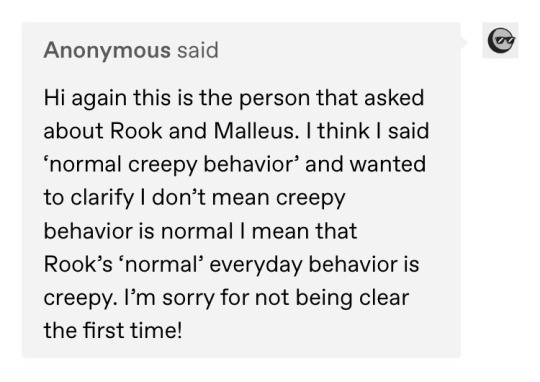
[Referencing this post!]


No worries, I think I know what you meant!! ^^ But thank you anyway for clarifying, it's definitely appreciated! asdhlbyioyqiqhubq I didn't mean for my reply to that original ask to be taken that seriously, but this does open up an interesting topic of discussion!
I do feel like this is really an issue of the perception of humans versus non-humans (fae, merfolk, beastmen, monsters, direbeasts, ghosts, Phantoms, etc.). We can excuse a lot of things that creatures of fictional races do because the "standards" for what is and is not acceptable shifts to adapt to the concept that these races are otherworldly and thus play by different rules, have different cultures, or operate under different expectations. Meanwhile, if it's a regular human, we can easily compare them to our real-life standards and expectations for human behavior (even if it is not done at a conscious level). Because of this, it is more "palatable" to hear "oh, this fairy killed someone" compared to "oh, this human killed someone" or “oh, a vampire drank blood” compared to “oh, a human drank blood”. It's also more likely that we attribute what is normally perceived as odd or, as this anon puts it, "creepy" behaviors as something else entirely when done by a non-human race. (Conversely, things considered normal for a non-human race to do may be strange if a human did the same.) Suddenly it's no longer "creepy", and the atypical behavior is attributed to being a characteristic that "makes sense" for that non-human race trying to adapt to life among humans.
As an example, let's consider some merfolk. Jade and Floyd have the hobby of collecting objects from along the seafloor. If you walked into their rooms and saw a chest full of miscellaneous things (combs, forks, pendants, shards of sea glass, etc.), you'd probably go, "they might not have these items under the sea, maybe they're curious about them!" If you found the same thing in like... Trey's room... You might be more confused and put off by it. "Why does he have all this stuff? He doesn't seem to be using any of it, they're just sitting here and taking up space."
Going back to the Malleus vs Rook scenario, let's now consider the original (with fae Malleus and human Rook). We will assume that you have zero prior knowledge of these characters, their backstories, or personalities, so treat it as though you're seeing them for the very first time ever. Think about the circumstances. You're alone in this new world, at the mercy of a headmaster who provides your (precarious) housing and food, and you JUST witnessed the horrors of what magic can do when pushed to its brink (since Malleus first shows up in book 2, not 1). You're in your rickety housing and, in the middle of the night, you cannot sleep. You decide to go on a walk to clear your head, knowing that it should be fine to be out even though the surroundings are dark because no one frequents this part of campus. But then you see a figure that shouldn't be there... lingering. Discomfort would be a perfectly acceptable emotion to have here. In the situation where it's Rook, you might be apprehensive. What's this guy doing here and what does he want from you? His big old hat does not help because the brim of it might obscure his face and make him appear like he's purposefully trying to hide his face. You might not be so eager to confront this guy and instead might look the other way or not engage at all in a conversation. In the situation where it's Malleus, you may also be apprehensive, but you'd also be significantly more curious. Because of his horns (a trait of being a dragon fae), he casts a very unique silhouette unlike any other student at NRC. You might be so surprised or curious that you approach him and try to learn more about the weird horned guy. I'd also like to again point out that the horns are the basis for Yuu's nickname for Malleus, so one of his fae traits ends up being a means of connection and socialization for the two. This would not be so for a human character that shows up on your front lawn late into the day.
Now let's reverse it. Let's say that Rook is the fae and Malleus is the human. Even if we assume that Rook maintains his hat but lacks the horns (since that's a trait of dragon fae specifically), he would still have the pointed ears of a fae and perhaps unique eyes. That alone could draw others in. Malleus would have no discerning physical traits to dismiss his behavior. He would most likely be seen as a weird human who likes to wander the campus at night. Rook would meanwhile be granted the benefit of the doubt, something like "oh, he's not human; is it normal for creatures like him to be active at night?"
In both cases, Malleus and Rook are "trespassers" (Yuu even gets the option to call Malleus that in 2-14). Your perspective would shift considerably based on whether you think of the "trespasser" as human or non-human.
Of course, this is not taking personality, social status, or other behaviors (like Rook's stalking or uncanny ability to collect details about his peers with but a glance, which Malleus does not engage in) into consideration. I'm only giving my thoughts on the first encounter with Yuu. However, I do believe that the change in one's perception due to human/non-human labels does extend into other interactions. For example, maybe fae!Rook's fascination with beauty and even him being invasive toward other students would be dismissed because this would be attributed to "oh, he's a fairy; he's curious about humans and wants to explore the world because his race is usually so sheltered and isolated from it all". Regular ol' human!Rook doing the same things is viewed as stalkerish and unsettling. Human!Malleus might be seen as more of an awkward loner that doesn't know how to interact with his peers as opposed to fae!Malleus, who has these same characteristics chalked up to him being a long-lived fae who hasn't had the chance to engage with people outside of his country.
I think that about sums up all my thoughts on this topic. Please let me know if you think I overlooked anything ^^
#twisted wonderland#twst#Rook Hunt#Malleus Draconia#disney twisted wonderland#disney twst#notes from the writing raven#question#Jade Leech#Tweels#Floyd Leech#Trey Clover#book 2 spoilers#Yuu
80 notes
·
View notes
Note
Hi hello Pluma 👋🏿
Hope you're doing well!
Got a little bit of a brainstorm for your dnd guys
Big squad is just traveling, or do they have some kind of goal? And – why are they all together?
Is there some particular world building you wanted to introduce, or mb it's just normal Faerun? I really like weird twists, like, then everything is flooded, orrrr maybe then there's no sun in this world! Or they have several moons... Just an idea to think about! :D
I also was thinking of spiderchair a lot-
Just imagine Scar running on the walls and ceilings cuz. Spider chair!!!
And I think Scar is often bored, then they are traveling on foot (he's too active fella to just sit and watch) – mb he has some kind of a hobby to keep his hands busy? Flute is cool and all, but the guy is VERY chatty, (what's why tbh I'm kinda sad he plays flute, no beautiful singing D:) and yea. I was thinking it might be wood carving, bit it's kinda doesn't fit him... Oh, I know! Mb magic tricks ?? I dunno, what do you think? :D
Oh and probably G is often complaining how tired he is from walking on foot... Is there on a chair somewhere a perch for him, or he's just unceremoniously sits on Scar's lap? :DD (Well they still can have horses but. Every horse would despise Grian u'all know that)
Yep... they are definitely The Wanted Criminals... Silly fellas QwQ
hi!!!!! :D <3 <3 <3
they do!! they eh. it's. again it's bits and pieces for now i hope you don't mind gkjdfkgjf. they kinda all have their own goals but they overlap more or less... they're all looking for a certain artefact, even ren's squad is :D i'll try to explain or draw stuff about it once i have all backstories linked up with it and can actually find the words to make it sound plausible LMAO
i'm not sure if i want the world to be very different from "standard" faerûn gfdkgjkfd i like the idea of multiple moons simply for the aesthetic :D and mmmm what's important is that gods are pretty close to mortals and even interfere every now and then. and i suppose the place they're in is coastal, since there's a lot of characters have some kind of connection to the ocean :D
scar is strapped into his spider chair so it should definitely be able to walk on walls!!!! idc if that's overpowered the chair is a magic item ok he gets to have a cool chair!!!!!!!
also yes yes he definitely plays music and doodles a lot!!! :D ohhhh you're right about the singing gfdkjgkjdf maybe i'll also give him a string instrument as a treat :D I'M NOT PICKING FAVOURITES I JUST. YOU KNOW
grian can definitely perch on the chair. and he will. he likes feeling tall :) he uses his flight to scout ahead but it's so very tiring... let him on the chair scar pls...
HFDJKGJDFG i'm so sorry if the things i say about this au make no sense or don't connect or kgfjdkjg i'm not good at this. but i really liked your questions and ideas!!!!!!!!!! ;-;
43 notes
·
View notes
Note
Okay! So, is there an RPG that's more rural, like farms and fields, windmills and carts, swamps and forests, but also still like big monsters and magic? Vibes wise, something akin to Amphibia the show, or Atomicrops the game. I'm sure one could just repurpose any regular RPG to make a world like that, but I'm curious :3c
THEME: Farming Plus
Hello friend, so I have a few games here that feel at least slightly fantastical, as well as a game that definitely works as a post-apocalyptic kind of game, although I don’t think any of the games listed here have the cartoonish-ness of either Apmhibia or Atomicrops. My main goal was to find games that felt like they communicated a slice-of-life style of game, while making room for a setting that feels outside of our normal experience. I hope you still find something that works for you!
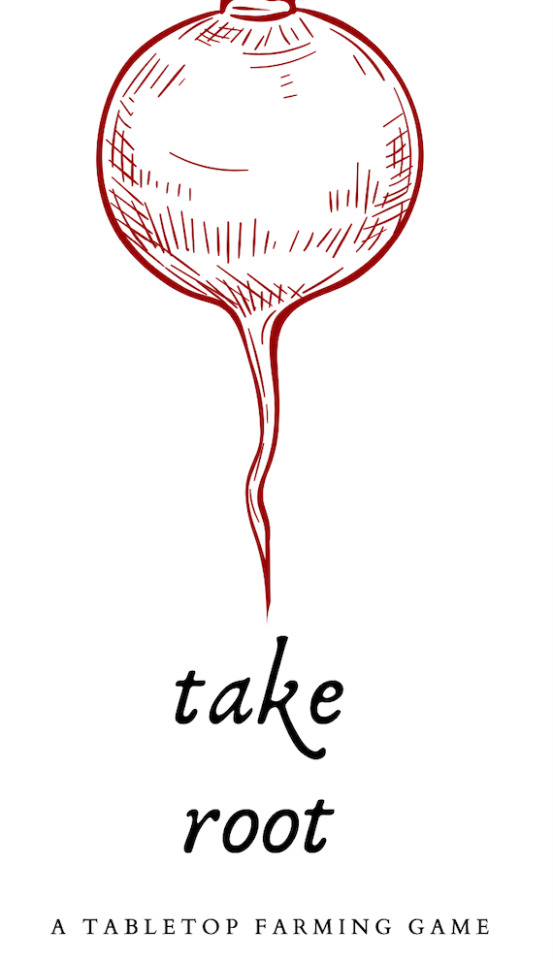

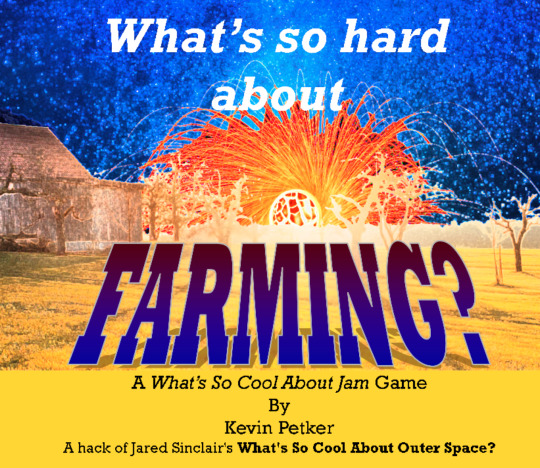
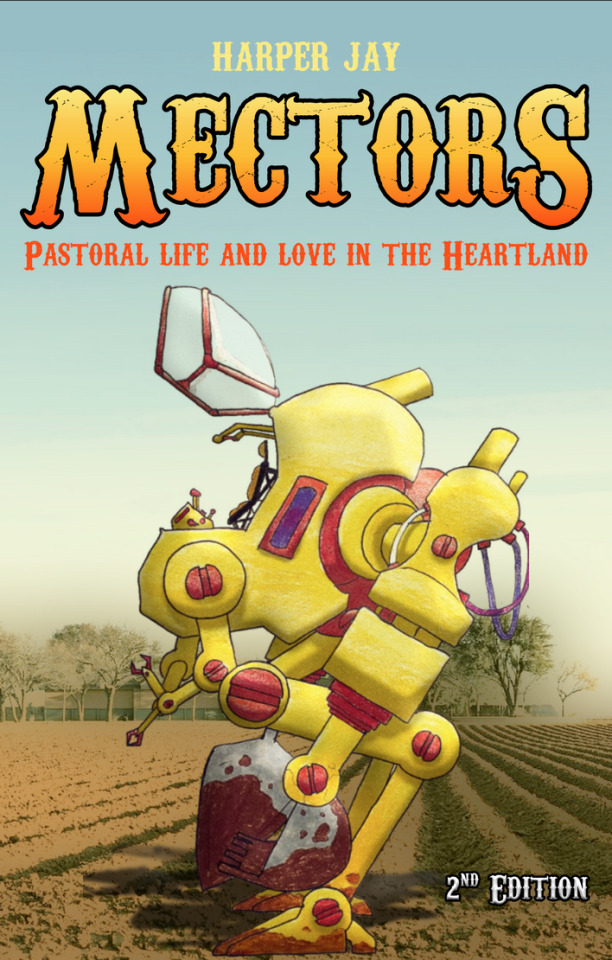

Take Root, by katykoop.
You've achieved the dream! You have a farm, in a cool place full of forests and the mysterious dungeon keep, and there is the promise of glory-- with a festival at the very end of the year. Play against several farmers, with a world master controlling it all, to win by having the most points in your farm display.
Each season is condensed into 9 days, with harvest on the 4th and the 8th. Unlock cool items through random events with NPC's, buy livestock, and traverse the dungeons of Dungeon Keep.
This is take root.
Take Root is a very procedural game, with each player responsible for their own farm, which they are tasked with caring for until harvest and the bringing of your fruits to market. The phases of the game are (predictably) sorted into 4 seasons with 9 days in each season, with two market days per quarter of the year. Different seasons have different basic crops, and certain items are more valuable than others.
However, you’re not just farming in Take Root - you’re also venturing into dungeons, and trying to romance select NPC’s. Diving into the Dungeon Keep is dangerous, but could have you coming away with rare items that give you money for seeds or items that allow you to fulfill mini quests - such as wooing the love of your choice, for example. The end of the game results in a winner - the player with the highest accumulated points, acquired through selling items, adventuring, and romancing NPCs.
All in all, Take Root is streamlined and simple, and yet manages to combine both dungeon delving and farming into one neat little brochure.
Farmtasy Simulator, by Guanaco Games.
The goal of this game is to build up your farm by managing resources, while dealing with threats both mundane and fantastic. Using cards for the encounters and dice to determine the outcome of actions taken, the player will gain resources and try to figure out how best to use them to continue building their farm. This game is meant to be played with one player and a GM. Farmtasy Simulator can be used as a supplemental mini-game for an on-going fantasy campaign, or as a standalone to enjoy some agricultural fantasy hijinks.
This is meant to be a two-player game, with one player and one GM. The character has dice and five stats with varying modifiers, while the GM has a deck of cards that they will pull from over the course of each year, used to generate encounters that will make the farming difficult. Farmtasy Simulator appears to be primarily designed as an add-on to another game, incorporating farming mechanics into a larger story. I think it might be a neat way to watch time pass for one character who’s trying to settle down and start a farm - perhaps each player takes their turn running through the simulator with the GM, or the GM use this as a mini-session with the only other player available to build their backstory before they went adventuring.
What’s So Hard About Farming?, by K.Petker.
This is a game about working on a farm and dealing with the triumphs and hardships of such a life. It might not be any kind of farm or farmers you’re familiar with, but the connection to the growing green and the earth is still there. Regardless of the season, there’s work to be done. And things might get a little weird.
I don’t own this game, but my experience with What’s So Cool About…..? games is one of light rules and plenty of freedom to let you take those rules where you like. What I expect from this game is just enough rules to give you a reason to roll dice, and the rest of the world is up to you.
On the plus side, this means that if you want to farm in a swamp, or in a post-apocalypse… well, you can do that! On the downside, the experience won’t fundamentally change according to to the setting unless you decide to do a bit of game design yourself, which is a delightful challenge for some, and an unnecessary amount of labour for others, so take from that what you will!
Mectors, by Harper Jay.
After the war, thousands upon thousands of bipedal mechanized fighting vehicles (or “Bimechs”) were left scattered across the land. Many were brought back to the capital cities to be repaired or scrapped, but the majority of them were too damaged to be easily transported. With the war won, the victors simply left their mechanical refuse in the battlefields to rust and wither.
In Mectors, players take on the role of a farmer, miner, fisher, carpenter, or some other worker in a labor intensive field. Mector Owners come from all kinds of backgrounds. Some own a Mector that’s been in their family for generations. Others came across theirs recently, through purchase or luck. And a rare few have managed to piece their own together using scraps from decommissioned Mectors, but this is even harder than it sounds. No matter how they got it, they now have a powerful tool with a long history.
I’ve recommended Mectors before for a similar request, and I think it definitely holds up as a great option for a fresh take on the slice-of-life farming sim - because it involves mechs! The setting is post-war, in a country that has learned to beat their technological swords into highly efficient plowshares - and the troubles that plague your settlements are less sinister and just the problems of a small community, such as the mushroom fungus spirit who is willing to guide lost travellers out of the cave, but also can’t seem to stop herself from feeding them mushrooms that also leech away their memories. If you want to tell stories about people solving everyday problems, set in an agricultural setting that’s wholly divorced from our own, I recommend Mectors.
Weeds in the Waste, by Megan Cross.
Weeds in the Waste is a solo storytelling game about tending a garden in a post apocalyptic wasteland.
Determine the state of your wasteland, create your gardener, plant your seeds, and tend your garden as you play through the seasons in the wastes. It is a narrative, storytelling game played using 2d6s and a 6x6 grid, as well as a series of prompts.
As primarily a solo game, much of the tone and pace of Weeds in the Waste is set by you, the singular player. This includes describing how the world ended, and how your garden started, as well as what kind of gardener you are. The game moves through different phases for every season, indicating what parts of your hard work pay off, and what parts are unfruitful.
The end game (and reflection phases) revolve around what withers, and where - which I think is truly reflective of the post-apocalyptic themes in this game. Try as you might, the current conditions of the wasteland can only be so fruitful, and you will have to learn how to live with a drastically reduced yield in comparison to the work that you’ve put in.
There are also rules for multiple players of Weeds in the Waste, so you can also make this a collaborative effort, answering the questions together, and strategically planting your crops as best as you can.
I’d Also Recommend….
My Small Town Farming Recommendation Post (some overlap with this one)
Grandpa’s Farm, by Tyler Crumrine.
Iron Valley, by M.Kirin.
24 notes
·
View notes
Text
So, I'd like to showcase a few things that I've put on DMsGuild because there's a whole lot more now.
I want to start off with Grimdark & Dangerous. Follower turnover is pretty high on Tumblr, and people go inactive pretty quick. So many people that see this will not be familiar with G&D. It was a huge project for me and I am very proud of it.
Grimdark & Dangerous is a 5e d&d homebrew book available for purchase on DMsGuild for $19.99. It comes as a PDF (for now) and is 159 pages of content geared towards gritty aesthetics. You can follow this link to see my full post on the book or the DMsGuild page here. It has a lot of content and is more than worth the price tag.
While G&D is my biggest item on DMsGuild, I have a nice handful of middle sized docs as well. These are mostly pay what you want (PWYW) titles and quite old. They are also more prone to errors and unintelligible text (where I just started writing and went into a stupor and created something I no longer fully understand).
+ Ancient Artifice Primer for Modern Practitioners (PWYW) - A magic item crafting system which can allow players to create magic items with some degree of value based balancing. It doesn't cover as much as it should in my opinion and is one of those unintelligible texts. However, I do still appreciate my very limited world-building of early runic magic and early graphic design work.
+ Better Backgrounds: 5e Character Building Alternative (PWYW) - A short book on how players can build characters without relying on race based ability score increases. I built on this premise in Grimdark & Dangerous and I'm still quite proud of how I did it in Better Backgrounds. This is a much rougher document than G&D and the writing has a handful of errors, but still decent.
+ The Inheritor: An Artifact and Exploration Class (PWYW) - A homebrew class option. I always say that if you want to play in a game and have a strong connection to the setting, run vestiges (Critical Role), or have a complex backstory this is the class for you. Inheritor characters come with a prebuilt artifact which functions as a growing magic item. You get to customize the item and there is a lot of variability to what your item can do (also includes a modular builder if you aren't very creative). Still pretty proud of this.
+ Mystic Revised (PWYW) - A full remake of the mystic UA class using my own opinions of what it should be. It's based, roughly, on the Nen system in Hunter x Hunter. It's a pretty fun class, but is not very mystic/psionic-y.
+ An Outcast's Notes on the Plane of Pensos - A Planar Adventure Setting for 5e (PWYW) - Don't pay money for this one unless you really genuinely love it. It's an outline and not worth much (IMO). Technically, it can't really even be sold on DMsGuild because it constitutes a homebrew setting (which they don't allow). I created it because I ran (and still do run) this setting and figured it could be a fun thing to share.
+ Plague Pestilence Parasite (PWYW) - A disease book that introduces new mechanics for how contagious diseases spread and how they can be integrated into 5e adventure settings. It also includes a handful of new diseases of varying danger (not all of which are actually threats to player characters). Still a decent book, though I now recognize it lacks some clear writing and has a handful of errors (I may come back and redo this book at some point).
+ Plague Pestilence Parasite: Avolakia Overrun (PWYW) - I don't think I'm really fit to write actual adventure modules, and this book is why. It is an adventure module written to use the rules in Plague Pestilence Parasite. It is still technically an open beta test. It's not unplayable, but I don't think it represents an adventure that players would latch on to (feel free to prove me wrong).
+ The Emissary: An Extraplanar Class (PWYW) - One of my first docs. It's a homebrew class heavily inspired by the Fate/Stay series (has nothing to do with any of the core themes/tropes/abilities of any Fate title) and is actually way more fun than it may sound. The premise: you get a little pocket dimension to store things in and it gives you a variety of powers (the ability to make a little nature preserve, become an auto-crafter, or be Gilgamesh in UBW and launch items at people).
Then there are smaller docs. These are moderately more expensive than most of my short docs (will list those later) but have a significant amount more content than my short docs. These are more recent docs and I generally have higher opinions of them because I was more skilled when I made them.
+ Grimdark Puzzles ($5) - An extension of the themes present in Grimdark & Dangerous. This document contains three (technically 5-6 depending on how you think about it) puzzles that present unique puzzles with dark aesthetics. I really like this doc.
+ From the Dwarven Vault ($1.50) - An item collection themed for dwarven cultures. This does rely a lot on dwarven stereotypes in fantasy, but I did get to bring in some fun things (like burial armor and the DUBA) that I think most people would really appreciate having in their games for lore and aesthetics. Also includes some content for rune carving.
+ From the Elven Vault ($1.50) - Like FTDV, this is a collection of items themed for elves. However, this one is a bit different. While Dwarves are smiths and warriors, elves are crafters. Not just of metal, but most mediums and particularly with mediums that take a great deal of time. If you like crafting in campaigns (if artificer is your favorite class), you want to take a look here because I added in crystal singing and there are three new sets of artisan's tools.
+ Lich Minions: A Lair Building Guide ($2.50) - I really liked making this doc and I am very happy with it. This is a guide for making lairs when your BBEG is a lich. It includes a variety of undead themed minions and how they fit into a lich's minion hierarchy. Each minion has some unique difference from their generic variety or are outright unique, they all have stat blocks. This is a really good resource if you want to do a short dungeon run campaign or a siege campaign. I plan on making more docs like this and I really enjoy this format.
Finally, I have my short docs (there's a lot of these). For simplicity I'll break these into two sub-categories: "Encounter With" and "Subclass".
The “encounter with” docs are short docs that include information on a unique or updated monster, a specific NPC, or a type of NPC. Each is given a stat block, has an outline of what kind of hazards are in the same area as this creature, and lists what kind of loot you might be able to gather from encountering this monster. These encounters include:
+ Archchancellor Ensiid
+ Dracolich Gollryn
+ The Athach
+ The Beholdra
+ The Boom Goblin
+ The Chaos Beast
+ The Destrachan
+ The Drow Paleweaver
+ The Introspective Terror
+ The Lifeblood Magus
+ The Musclemancer
+ The Non-Phaneron Beast (note the cover of this doc is intentional, as the beast does not have a visible form)
+ The Pale Widow
+ The Silkscale Coiler
+ The Soliptic Nightmare
+ The Sunken Effigy
+ The Venomous Plesiodrake
+ The Werewolf Lord
(I feel like I'm missing one...). All encounters have a $0.50 or $0.75 price tag depending on if the encounter features an original or converted stat block.
The subclasses are just that, subclass docs. I really love making subclasses and I try not to burn out on them because I have so many subclass WIPs I want to do. These subclasses include:
+ Druid: Circle of the Grove (Plant druid. Why doesn't this exist already?)
+ Druid: Circle of Witchcraft (Discworld witches, love this one)
+ Fighter: Blade Drifter (I just want to link a song from the Sonic Riders franchise here, but they're all so corny)
+ Ranger: Hell Skulker (nine hells/abyss ranger, also really like this one)
+ Warlock: The Greatwyrm (DRAGON PATRON! Why doesn't this exist already?)
These subclasses all have a $0.75 price tag. I will probably be making a lot more of these, they just take a bit longer than the encounter docs.
89 notes
·
View notes
Note
1. Thank you and That One Anon for making the English speaking fandom for Weapon Creator!
2. In the name of bullying Yun Taeheon, I need his reaction to Mun Doyun- aka the B rank assassin that was Shin Junseo’s guild leader. Cuz objectively, Yun Taeheon knows a lot can happen in a year and stuff, but also he’s an S-rank leader of a top guild that is willing to give Shin Junseo just about anything and he still cannot recruit him. And then there’s this B-rank nobody (to him) who specifically hired Shin Junseo - as a D rank weapon creator who could only make an average knife every 20 seconds - BC HE HAD A SKILL THAST DESTROYED THE BLADES HE USED. Literally the same reason!! But no, somehow Yun Taeheon is losing this race.
Even better if he somehow gets more backstory or through some time shenanigans he meets the other Mun Doyun, who is basically the reason Shin Junseo is even as good as he is. Like, the reason sjs learned all he could and stuff. Anyway, yth being objectively, obviously on a higher level than this dude and yet still absolutely seething at the very idea of how much he apparently is not measuring up. How do you think that should go?
also, looking at the firsts chapter and think the first chapter and I think Sjs could be the little kid at the very beginning? Meaning that he has grown up in he world of hunters and gates, giving some cool world building to how this is a whole generation of ppl growing up with gates and magic.
However, for the sake of getting more of your sugar daddy au, I am ignoring that. Or maybe it could be incorporated, like- yth was trying to figure out how to ask sjs for just, an actual relationship. And sjs had stopped their contract after signing onto the guild. Extra tension!! Cuz obviously yth wasn’t gonna reach out and be like, “Hey, so that didn’t work out…”
glad to be of service!!!!! taking it from the bottom here, you mean this kid?
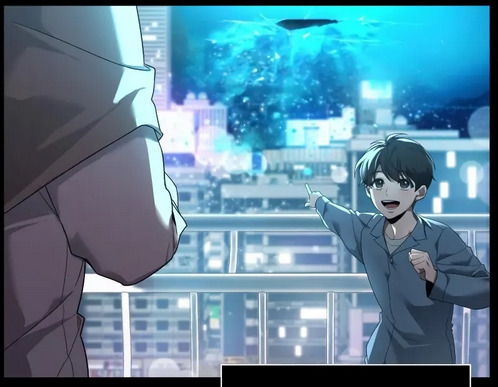
Huh! Now that you mention it, that could track! Would be rather interesting too as I'd put this kid somehwere between 8 and 12, which implies dungeons have been a thing for much longer than just a couple of years. Tho I assumed the adult in the next panel was YTH, so hmmm. But also what does this say about the state of his family. where the fuck are they. I need answers. And also I'd love some worldbuilding around growing up in such a world. In SCTIR, one of my fave things is to linger on like, the first weeks after the dungeon breaks. how did legislation change, the government, the way people reacto to this-
"In the name of bullying YTH" man we really all just took a look at this guy, who is probably meant to be like a cool badass character and decided we shall treat him like our sibling's new boyfriend and thus make fun of hinm. huh. god given right to bully the man.
But yeah, do you think YTH assumed just a little bit that SJS had like weird trauma. and also like- okay full confession time. when I started reading this, I assumed this guy would be our love interest second protag. I mean. look at him and SJS reaction to praise
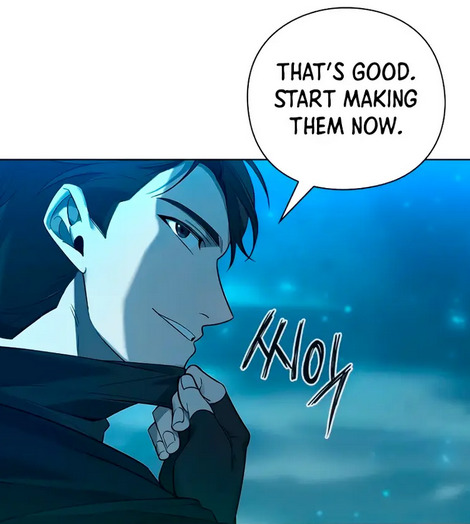
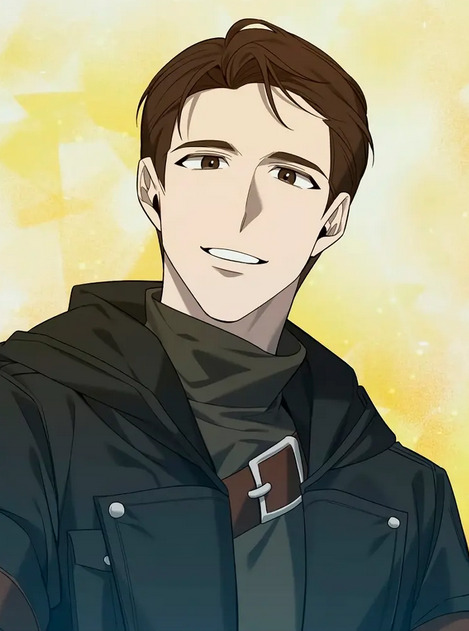

and the way SJS also thinks of this guild in the future memories he receives? a place where he was accepted, found friends, where they kept pushing forward together- Listen. also the way it lingers on MDY's body there. I'm just saying, the vibes are accurate. to me.
Anyway, YTH does have the vibes of somebody who is incredibly understanding but privately also has beef with a dead man. he knows it's unfair and stupid, but also he could buy SJS a god damn pent house apartment. he would. that and any item he wants. actually I just realized while typing this would've been really fucking great to insert into my little soulmate fanfic given I did toss in like one sided bonds existing there. something to consider for the future.
But man, I think it would be interesting if SJS is confronted with him again also in the context of like, SJS not recognizing MDY's brother despite his future memories, which sure has some implication. I told a friend that like my assumption is that Mun Dojin died in the other timeline and I desperately need him and SJS to talk because even if the memories SJS has never actually existed here, that still sort of makes him the only person MDJ can talk to.
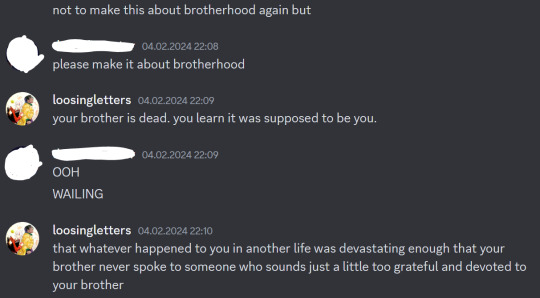
actually, man. this would make anything SJS/YTH even funnier. here's your crush. there's your crush's vampire familier and his ex guildmaster's (former bf's??????) little brother. god I need MDJ and Elizabeth to show up more often. slkdfhsldkh sorry got entirely off track here.
OKAY BACK TO SUGAR DADDY AU- I just realized how fucking hilarious this would also be because like. SJS manages to bag one man and it's this big shot guild leader. and instead of signing up with his guild, he goes to these small nobodies. like, it probably just makes sense to SJS. This was a job, now here is another, newer job. Life goes on.
YTH meanwhile is the math meme. Min Huisu told him to get a social life. he paid someone for that, but the guy turns out to be actually cute and fun, so he'd like to have a relationship that is not just superifical. and this guy just. mcfucking signs on to a guild he hasn't even heard of. f in the fucking chat
#somebody should start a wiki for this fandom btw so i don't have to keep looking things up in the chapters#not me tho i'm already busy contributing to another wiki#weapon creator#sorry this god so rambly and all over the place i'm v exited#jacqtacq#ask
21 notes
·
View notes
Note
What the shit. Fighting a god in hand to hand combat as a gold dragon using immovable rods goes so fucking hard and it’s the backstory for a character that’s just in the main backstory???????? AMY???
You know how a lot of people, when making DND characters, make the mistake of having their level 1 PC have an elaborate backstory where they're super badass and already recognized as a hero?
When I made Ash I did the opposite. Her backstory is elaborate, yes, but in very mundane ways that inform her personality and how she perceives the world around her, and build up the logic of how she makes decisions.
I made everyone AROUND my PC a super powerful character who had done incredible things, and I gave Ash anxiety about it.
She feels, constantly, that she is inadequate by comparison. Her entire frame of reference is shaped by a bunch of women in her life that are outstandingly powerful, and she's just a quiet girl who makes leather goods and sells them for a living. She thinks of herself as the NPC in other people's more impressive lives.
Her mother, Lailah, is a nearly seven foot tall divine warrior created in Elysium to destroy Pit Fiends. She's an angel of lightning built like an MMA fighter, and she wields a weapon like piece of a lightning bolt (not stylized, I mean a real, glowing crackling arc of electricity that she holds like a staff and can be used like anything from a polearm to a spear to a whip, and when thrown it acts like a Lightning Bolt spell). She is built, both narratively and in game stats, to be an unkillable holy destroyer, capable of fighting MULTIPLE PIT FIENDS simultaneously, and winning. She's a CR 10+ magical creature (she's a homebrewed mix of Deva and Erinyes stat blocks with some unique flavor) with eighteen class levels, 16 in Zealot Barbarian and 2 in Fighter. She has a strength of 27 and a constitution of 25. She's designed to deal HUGE amounts of damage, tank unfathomable amounts in turn, NOT DROP WHEN SHE HITS ZERO HITPOINTS, and keep swinging until every devil in her way is a pile of dust, then use bonus action Second Wind to bring herself back above 0 so she doesn't incur the auto-death caveat on Zealot Barbarian's Rage Beyond Death ability. One of her attuned items is also the very simple uncommon item "Periapt of Wound Closure" which automatically stabilizes you at the start of your turn, thereby resetting the death saving throws she would theoretically have to make each time she gets hit below 0. Also, as an angel, she's innately immune to auto-death effects like Power Word Kill, which closes almost all loopholes that get around her build. She is UNSPEAKABLY badass. I ran a simulated round of combat with her once, and she could potentially one-shot a CR 15 Skittering Horror (228 HP) in a single turn. Her theoretical maximum damage output is like, 456 damage in a turn (granted this assumes all crits and rolling max damage).
So that's Ash's mom.
Aria is interesting. She was always strongly attuned to the forces of nature, and her magic grew quickly. Where Ash grew up with someone she knew would always be there to protect her from anything, Aria did NOT have that safety net, and spent her formative years learning to be more self-sufficient in terms of relying on her own power. So eventually she got sucked into an adventuring party consisting of herself (a tiefling Witch subclass with very strong druid flavor), a tiefling zealot barbarian, and a couple of elf twins who were an Arcana cleric and a Celestial Warlock. Sometime after they had made a name for themselves, they were tasked with stopping a suspected fledgling vampire who had been kidnapping girls and killing a bunch of people. When they arrived, they met Cass, who was very much NOT a new vampire. She was almost 150 years old and had been protecting women from abusers and overzealous debt collectors, and things had gotten a little messy with one or two of them, leading to a lot more attention than she normally got. They start off fighting Cass (Aria polymorphs herself into a dire wolf and lunges directly for the throat, which Cass found amusing and impressive) but realize in the banter that Cass wasn't the real problem, and she ends up being a sort of a lesson for the group in terms of whose word they trust and who they take jobs from (YES THE BACKSTORY'S BACKSTORY HAS NARRATIVE ARCS AND MORAL LESSONS THAT LEAD TO LONG TERM CHARACTER GROWTH OKAY I CAN'T HELP MYSELF). Cass, having a particular rapport with Aria, ends up joining their party as a dhampir Soulknife Rogue/Shadow Monk.
Yes, that's all backstory that I made up for an imaginary campaign that exists entirely as a set piece for Aria as one of Ash's story NPCs. This doesn't even touch on the fact that I liked Cass so much as a character that I gave HER an entire backstory of her own. I DON'T HAVE A PROBLEM.
Anyway the team only makes a bigger name for themselves for handling things that other groups can't. Eventually, they just happen to be in the Tenth District when the War of the Spark happens (major established event in the MTG canon), and I basically added some extra "scenes" to it that didn't violate existing canon so I could have that be the climax of their imaginary campaign. One of Aria's partners was a new planeswalker at the time and her spark got harvested by the Dreadhorde, specifically by the god eternal Bontu.
Gods in Magic The Gathering aren't honestly that special? They don't seem to have THAT much power, all things considered. Ravnica's gods are mostly powerful magical animals, and in the most recent Magic Story one of their gods (Anzrag the Quake Mole) was captured in an "evidence capsule" (basically Magic's version of a Pokeball). The most powerful god in MTG is probably the Ur Dragon honestly, unless you count the Eldrazi, but that's a whole other conversation since neither of those actually have the "God" creature type.
Anyway, Bontu was one of the gods of Amonket (basically a plane based on ancient Egypt), which had been conquered by an Elder Dragon planeswalker named Nichol Bolas. HE was the one who actually killed all but one of Amonket's gods, and then another planeswalker named Liliana Vess (extremely powerful necromancer) raised them as zombies for his army, because Bolas had a ton of complicated leverage over her (magical contract that he could invoke to kill her if she betrayed him). So Bontu was a god zombie.
Here's a reference:
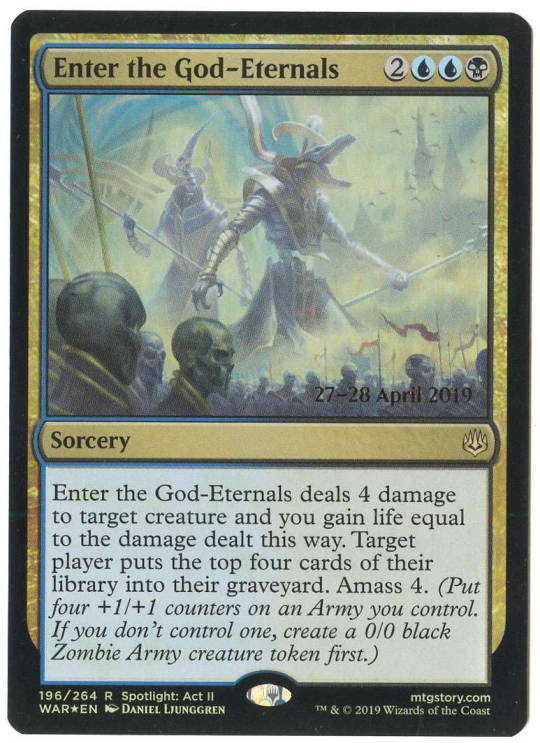
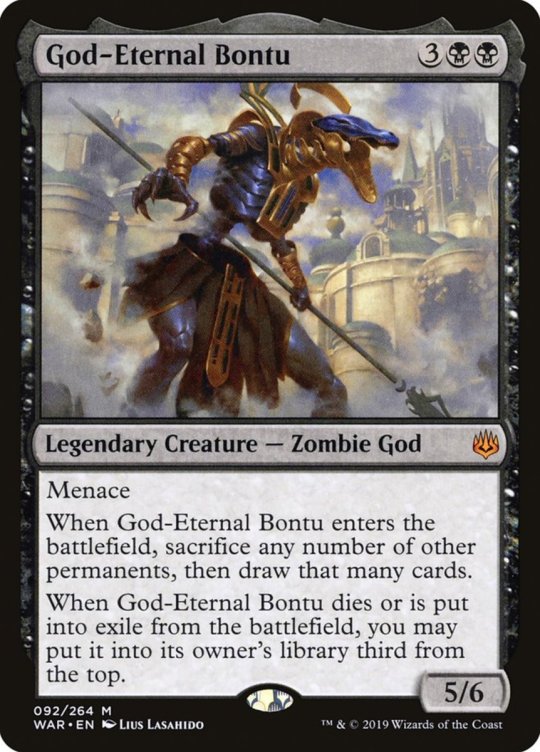
Well, Aria was a level 18 Witch at this point since this was the climax of their campaign, so she had access to the Shapechange spell, a 9th level transmutation that lets you become any creature with a challenge rating equal or lower than your character level. And the best candidate for that was an Adult Gold Dragon (CR 17). So Aria goes full berserk and stands up on her dragon hind legs and picks a fight with a dead god that she's determined to make deader, and has a Godzilla vs King Ghidorah standoff with her.
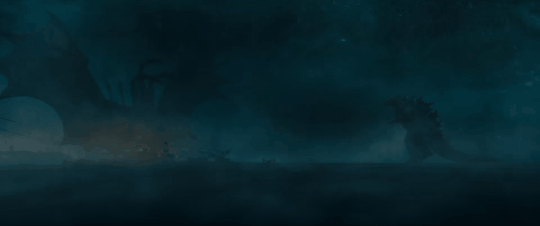
So how do you fight a god that can suck your soul out and instantly kill you with a single touch? You don't let it touch you.
What Aria did was basically inspired by this gif of a Wildebeest trying to charge at a lion:

Or this:
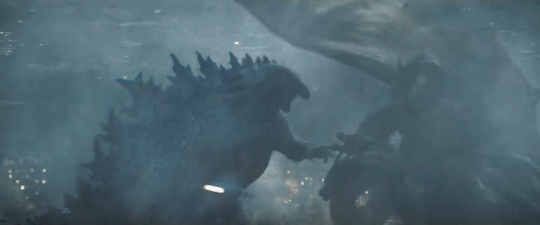
And to be clear, yes, I'm saying Aria was the lion in that situation. She basically did a big dragon threat display to get Bontu's attention, and used the Gold Dragon's weakening breath to give Bontu disadvantage on Strength checks and saves. Bontu charged at her, and at the last second Aria dropped to the ground and then shot back up, clamped her teeth around the god's throat, and used her weight to throw Bontu around and knock her off balance, and her superior strength to grab her by the wrists and wrestled her to the ground so she couldn't get a grip on Aria. She had every part of the god that could have killed her pinned, and used the claws of her wings to pull Bontu's armor apart and tear at everything she could reach while thrashing her around. It was Fen, the Arcana cleric, who thought to use Immovable rods to pin Bontu down so that even if Aria lost her grip, Bontu wouldn't be able to immediately one-shot any of them. So Athena (barbarian) and Cass (rogue/monk) as the two martial classes were the ones who got close enough to handle that while Fen and her sister (Gwen) used whatever holy magic they could to help from a distance.
Now CASS had a problem, because she's a DEX based martial class, not a strength based one. She needed a boost to be able to get this job done. So she drank some of Bontu's blood from one of the wounds Aria had left on her arm to give herself a burst of strength. Except. She had to get real close to do that. And Bontu managed to get a loose grip on her, and tried to suck out her soul.
The magic that makes Cass what she is is very old and very powerful. It binds her soul to her body in a much stronger way than any living creature, fusing the two together to prevent her from dying (i.e. by having her soul separated from her body; Cass can recover from almost any conceivable physical injury as long as there's life energy, in the form of blood, for the magic that keeps her alive to feed on and maintain the seal between her body and her soul). BECAUSE SHE WAS FEEDING ON THE BLOOD OF A GOD AT THE TIME, the magic holding her together basically fought against the magic that was trying to rip her soul out, and it had enough fuel to hold on until Aria's thrashing forced Bontu to let go. So Cass survived the Elderspell thanks to a very weird and unrepeatable set of circumstances (which allows something narratively impressive and legendary to happen without being gamebreakingly overpowered and violating the established rules of the world).
Because of how her magic draws energy from other things, though, there was a side effect: she also accidentally took in one of the planeswalker sparks that Bontu had harvested. So when Cass had healed enough for her soul to no longer be dislocated, her spark activated and she became a Planeswalker. (I imagine a soul is connected to a body mostly through the nervous system, because that's how a brain holds consciousness in it, so a "dislocated" soul is like something glued to every nerve ending in your body being pulled on with an enormous amount of force, trying to sever that connection; imagine trying to pull yourself off the ground when every nerve ending in your body is superglued to the floor by something akin to the Strong Nuclear Force. It SUCKED.)
The team ended up being forced to retreat because of Cass' injuries, so Aria didn't actually manage to kill Bontu personally (or die trying, which in her grief-rage she was fully open to). Right about this time, my bottle scene ends and Magic canon comes back into play: Liliana betrays Bolas and turns the Dreadhorde against him, and Bontu ends up being the one who bites him and rips out HIS spark. Due to the enormous rush of energy of consuming all of Bolas' stolen Planeswalker sparks (tl;dr he was trying to become a god), and with the added bit of lore that it was Aria's team that heavily injured Bontu just prior to this, Bontu exploded in the process.
This resulted in Ravnica playing a game of telephone in the chaotic aftermath of the War. Aria fought a god. She's still alive and that god is dead. Rumors spread and now Aria is misremembered as the one who killed Bontu. Half the plane thinks of her as the "god killer." All she wanted was to avenge her lover or die trying.
Neither outcome happened, and now she's credited with the very thing she sees as her greatest failure. And that trauma has haunted her ever since.
#so my backstory has a backstory with its own backstory#this is a normal and healthy way to approach storytelling I think.#so anyway Ash is surrounded by badass women and doesn't recognize her own potential#because her entire frame of reference is the most outrageous statistical outliers#Ash#Aria#Lailah#Cass#eldritch OCs#Uneiverse#I have one character whose backstory goes back over 6000 years have I ever mentioned that#y'all don't even KNOW the shit that lives in my brain#also I invented god from scratch so TECHNICALLY I made backstory for the universe itself and it goes back billions of years#when I say that I don't mean I made up A GOD from scratch. I mean I reinvented the CONCEPT of what 'god' even means.#and built a universe around that concept#I also have some cool thoughts about the nature of time and fate that I haven't talked about yet#the inside of my brain is a very interesting place. try not to get lost. the exits are not clearly marked.#what if I gave my characters *T R A U M A*#anyway I'm glad you thought this sounded cool enough to ask about. I hope you feel the same about the rest of the story someday.
17 notes
·
View notes
Text
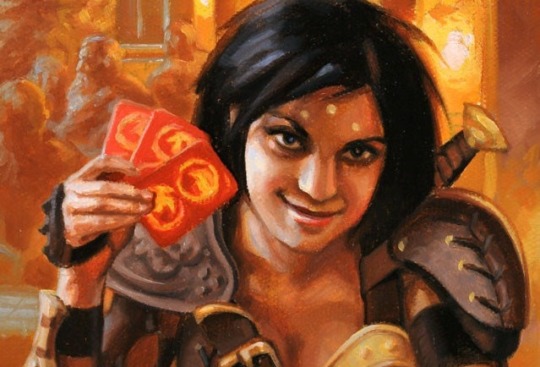
Masterposts
How to Rogue: a D&D 5e Masterpost
D&D 5e: Roguish Archetypes Masterpost Part I & Part II
Building a Rogue in 3.5 and Pathfinder: Collected Resources
Rogues in Fantasy Literature Masterpost
Dagger Fighting Masterpost
Thieves’ Cant Masterpost
Lock Picking Masterpost
Traps Masterpost
Tags and Credits
Basic Tags
How to Rogue: Exploring the Rogue class in D&D and assorted roleplaying games. Includes #fluff (roleplaying tips, character concepts, #backstories), #crunch (optimisation tips, guides, #magic items, #homebrew), and memes.
Rogues in Fiction: Exploring the Rogue archetype in literature, folklore, poetry, comics, games, etc, and #analysis thereof. Also relevant art.
Rogues in Theory: Exploring the Rogue archetype in history and society, and relevant subjects. Also #words of the trade (#etymology, synonyms, #thieves’ cant, linguistics).
Rogues in Practice: Tips on #how to stab and #how to steal (or, ahem, how to write/roleplay about stabbing and stealing), #exemplars of the trade (real life rogues and their exploits), and some less exemplary exploits. See also our esteemed colleagues in the #animal kingdom.
Art - Rogues Gallery: Rogue character portraits.
Art - Scene: Landscapes, fight scenes, #bar brawls, #heists, dungeon-crawling, etc. For urban landscapes, see #the city speaks.
Thieves’ Tools: Lockpicks! And assorted tools for breaking and entering where you’re not supposed to.
Tools of the Trade: Weapons! Mostly knives and daggers from all over the world (see the Dagger Fighting Masterpost for all the relevant tags), and some pretty swords and crossbows and the like.
Prison Ballads: The soundtrack.
…There is some overlap.
Quirky Thematic Tags
The ecstasy of gold: For loot, treasure, gold, and the deadly sin of greed.
The city speaks: For the hidden splendour of the city, from the gutters to the rooftops.
Heroes and villains: For good and evil and that grey waste in between which Rogues so often populate.
The phantom of liberty: For freedom, and storming the gates of heaven.
No tears for the creatures of the night: For the deadly sin of lust and its professionals.
The gambler’s face cracks into a grin: For gamblers and card cheats.
Dishonour on your cow: For honour among thieves, criminal codes, omertà, and blood feuds. File under the deadly sin of pride.
Fearlessly fleeing: For craven rogues and clever rogues. Wait, there’s a difference?
The ramblin’ rover: For vagrants and vagabonds and for the long-winding road.
The right to be lazy: For the deadly sin of sloth.
The hired man: For (mostly against tbh) the Rogue’s nemesis, the cop. See also #prison.
Swinging from the gallows tree: For the ignominious end that awaits us.
The quirk is strong with this one: See also #the potatoes of defiance, #big thief little thief, #the thrill of the heist, #the rich remember, #daring escape, #be the chaos you want to see in this world, #carnival, #stabbity, #only knives left, #dubito ergo sum, #fuck the king, #profanity makes everything better, #information wants to be free, #a begging I will go, #forbidden fruit, #the groaning rogue, #I fought the law, #the deserter. (#Tag namer explains some of the quirkiness.)
More Tags
Tabletop tales: It happened in somebody’s game.
D&D history: The conceptual and mechanical evolution of the Thief Rogue class in D&D, and other interesting stuff from the history of #roleplaying.
TRS: The Rogue speaks. Not to be confused with TSR.
Self explanatory: #D&D, #3.0, #3.5, #5e, #Pathfinder, #Pathfinder 2e, #AD&D, #roguish archetype, #feat, #skill trick, various #skills (#deception, #sleight of hand, #stealth, etc), #rogue fashion, #correspondence, #long post.
For anything else, try the search function and hope, but don’t get your hopes up because tumblr’s search function is appalling. Googling with the parametre site:theoutcastrogue.tumblr.com might actually be better.
Credits
All original work published here (i.e. the words and the occasional photograph of @theoutcastrogue aka @we-are-rogue, 2016–2023) is licenced under a Creative Commons Attribution-NonCommercial-ShareAlike 4.0 International Licence.
Avatar image: “Tymora’s Luck” (detail) by Ryan Pancost, from Dragon Magazine #388 | Wizards of the Coast 2010
Header image: “The Thief” (detail) by capprotti, for the game Exile Gods | Distant Orbit 2009
The WeAreAdventurers collective was started in 2016 by @wearepaladin.
See also the archival blog @wewererogue.
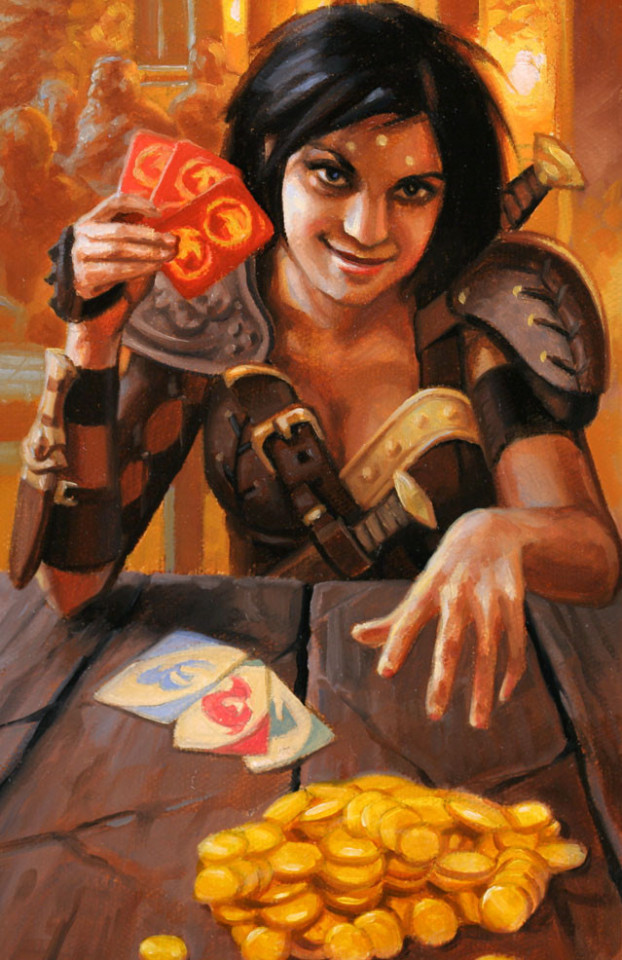
88 notes
·
View notes
Text
How to optimize your tabletop character with minimal headache
This is a tool for building and equipping ttrpg-characters. It might be helpful for people like me who struggle with weighing options intuitively and easily start to feel like they accidentally built their character to be less interesting or effective than other characters at the table.
1. decide on the category you want to comb through
It can be skills to put points into, gear, feats/talent options, whatever. For my example I picked magical items.
2. make a table
First column: name of The Thing (e.g. weapon, item, skill...). Write down all of the instances of The Thing that you want to compare.
Second column: joy - this will denote how much joy it sparks in your heart to have/be able to use The Thing, without taking into consideration how sensible it would be.
Third column: RP - this will denote how well The Thing fits your character concept, be it from an aesthetic point of view, because it fits into your character's backstory, whatever.
Fourth column: practical - this will represent how often you assume you will be able to use The Thing in-game.
Fifth column: effective - this will represent whether this is the best way to achieve whatever The Thing is good for or whether there's better options.
Sixth column: score - this one calculates the end result.
The table then might look something like this:

3. add numbers
Now score each item in each category (joy, RP, practical, effective) from 1-3
1 = not really / no
2 = okay/ it's alright / so-so
3 = yeah!
e.g. I'm playing an orc paladin and I'm checking which of the items I should get for her. She grew up in the city and she aspires to be a knight in shining armor.
Item: Lighter (a magical stone that can make fire).
Doesn't really spark joy, so that's a 1.
Fits her character concept so-so, since she would have had little reason to get one before the adventure starts and she's not very outdoorsy, that's a 2.
Pretty practical, I can imagine it becoming relevant in almost any adventure, so that's a 3.
Finally it's not very effective, because in the setting we're playing, we have many choices for how to make a fire and, most importantly, we'll have an elemental mage in our group, you can snap a fire into existence anytime he likes, so that's a 1 again.
Count it all together and the score comes up to 7/12.
I repeat the scoring until the table looks like this:

Which means that from all the options listed, I would be best advised to get a large light quartz, followed by the lighter.
The closer to 12, the higher in priority it is, the closer to 3, the more easily I can discount bothering to get it at all.
4. notes and acknowledgements
What I like about this system is that it allows me to split a big and hard decision into many small and easy ones, so if I score diligently, I'll arrive at a sensible result that's not just min-maxed, but also takes rule of cool and roleplaying into account.
It might also help with "character build envy" because you didn't overlook any options and made sure to consider everything to the best of your ability. So I hope it's helpful to someone else out there.
... or you might look at this and have the same reaction one of my buddies had, which was:
"you put a number on joy???"
Either way, thanks for reading ^^
-
If you use excel or libre office calc, you can use a formula to automatically calculate the score, which would be
=SUM([first cell with a number]:[last cell with a number])
e.g.
=SUM(B2:E2)
which would automatically add together every number from B2 to E2. Alternatively you can just select the cells and it should show you the result in the down right corner.
#tabletop#ttrpg#ttrpg community#dungeons and dragons#earthdawn#shadowrun#the dark eye#blades in the dark#vampire the masquerade
18 notes
·
View notes
Text
Palia, a casual mmorpg review
A friend of mine was hyping a new game she was playing: Palia. Mostly she was hyping her attempts to romance one of the NPCs, but enough other details leaked through that I decided to give it a try. And I liked it.
I'm generally not a fan of the mmorpg genre, partly because I hate being social, and mostly because I hate fighting and my reflexes absolutely suck. Palia, thankfully, is more casual/cozy, and while there is a hunting aspect, they're all prey animals that run away. There's no fighting. Thank the gods.
The basic premise of Palia is that humans died out/disappeared a long time ago, leaving the world to the majiri, who have pointy ears and purple skin. There's also the grimalkin, a race of alien felinoids who arrived a few centuries ago and set up shop. And there are galdur, robots who have been around since the Age of Humans.
For Mysterious Reasons one of Palia's deities, the Phoenix, has started dropping humans back into the world, particularly around the remote village of Kilima. That's where the PC comes in.
A lot of Palia is your standard fare (I think). You get to know the NPCs and build relationships with them through talking and gift-giving (which is an actual mechanic of the game). There are quests and loot piles, and a number of skills you're meant to level up in: Hunting, Fishing, Mining, Cooking, Furniture Crafting, Foraging, Bug Catching, and Gardening.
The mainline quest, of course, is trying to figure out what happened to the humans and why you're suddenly reappearing. The list of items needed in order to complete the first part of the quest was... unpleasant, IMO, and involved a lot of epic-level rarity items that take a hell of a lot of time and resources to gather. That, again, is pretty much par for the course with games like this: allll the grinding. I've posted about that before, but thanks to some advice I did finally manage to get everything I needed. My main source of stress on that score is that I am a completionist, so leaving a task unfinished was stressful for me. Hells, it took me a while to accept that I didn't need to finish all tasks/requests immediately, and those are mostly plot irrelevant.
Once you accept that you don't need to do all the things right now ASAP, it's a lot more fun. Even the main quest only recently unveiled part 2, and while it includes some new (and easier, IMO) tasks to complete, it's also more waiting for the "big" update coming in '25, when a new area will be made available. Or I assume that's what's going to happen.
You get to build and decorate a house, which has been more fun than I expected. Tish, in particular, will make expanding your house easier, and you will get hecktons of furniture from loot boxes, from Tish's store, from recipes you can build yourself, and from the Grimalkin underground market.
I've been enjoying playing, even when all my current quests are filled. Even when there's "nothing to do" there's still stuff to do, and selling off all your excess supplies gets you more money for buying more things.
The NPCs are, for the most part, a lot of fun to interact with, even if every single one of them seems to have some tragic backstory. The only character I don't like is Tamala, and I think it's partly calculated that way. She's the witchy "vamp" type character and flirts outrageously with anything that has a pulse. I understand the narrative purposes of characters like that and I know the majority of the time the attitude is manufactured to keep folks at a distance, but I still find her unpleasant, manipulative, and mean-spirited.
The only real issue I have is that some of the longer-term players are clique-y assholes who like to tear into newbies for not following the unspoken rules of the game. Which are, y'know, unspoken.
Most people are very understanding of newbies and have no problem politely explaining the community-developed courtesy of "wait to chop down the magic trees til everyone can get here," but there's a handful who choose to bitch at each other about it and shame folks for chopping "too soon" and thus "ruining" it for everyone else.
Here's the thing: the grove of "magic trees" appears every in-game midnight, and time moves a hell of a lot faster in Palia, so you can get multiple groves in a single day. There is absolutely no reason to act like an inflamed, pustulating asshole just because you couldn't chop one grove. There's no reason to make newbies feel bad for not knowing something, especially when no one fucking tells them.
Thankfully that group is in the minority. I think I've only seen newbie-bashing bitch-fests twice, but that's still two times too many, IMO. Especially for, and I really can't stress this enough, something that isn't an actual rule of the game. If it was a rule, folks wouldn't be able to chop early. I appreciate the courtesy of people waiting for everyone to gather, but acting as if it's some grievous crime is fucking bullshit. Ugh.
Anyway, the game itself is fun. I love nerdy girl Jina and her helicopter mom galdur friend Hekla. Widower Ashura has Big Dad energy. Uptight librarian Caleri and her conspiracy-loving twin Elouisa. Zeki the grimalkin scoundrel with a heart of gold. Tau, the best pupper. Lots of fun and friendly characters, and very little need to interact with other players. You can also block/mute people or just mute the whole server, which is nice.
I'd recommend it, especially for people who like the idea of an open-world RPG thing but are more interested in stories than fighting. You'll get a lot of stories with Palia.
3 notes
·
View notes
Text
Hey, so D&D community - this is tumblr, I know you're there - is it normal to base your build around magic items? Like, from session 0?
When I DM, I usually just allow my players items that are common or uncommon if they just ask. Anything else, it'll usually be at the end of a short dungeon. At this point, if my players see we're raiding a Goblin Nest, it's code for "there's magic items here, go gettem'.
Now that I'm a player (I'm not retired from DMing, lol), my DM thought it was weird I didn't put a magic item on my sheet and helped me pick something out that complimented my build and fit my backstory.
So, like, is it normal? Am I being a dum-dum?
4 notes
·
View notes
Text
tav challenge - (new tav) Ren edition!! This can be their introduction of sorts
They're a half-drow artificer (except I can't play them as an artificer because bg3 HATES FUN /lh) and they're being haunted by the ghost of the legendary pirate captain Juniper Stormaven. They're very pragmatic and don't tend to be very outwardly emotional, preferring to let the things they create speak for them.
favorite weapon: As soon as they find Dammon I think they commission a special sword enchanted to extend into a whip or retract back (if you've seen the Dragon Prince I took a lot of inspiration from a character in that).
style of combat: Ren is very tactical and likes to plan things out thoroughly before they get into a fight, though they try to avoid violence in favor of diplomacy.
most prized possession: A crumpled letter they've sewn inside the lining of their clothes. It's the only thing they have from their birth mother.
deepest desire: To run their own store or maybe even have a ship with all the things they enchant and to create/sell automatons that are both practical and beautiful. They want to use their creations to help people.
guilty pleasure: They have a huge sweet tooth
best-kept secret: Ren can't read. They're very smart and they've tried and tried to learn, it's just never worked, reading is nearly impossible for them. It's the reason they flunked out of wizard school - they were actually supposed to attend at the same time Gale was, but the academy refused to accommodate them (with magic items that could read papers out loud to them, etc), and so they failed all their classes and had to leave. Juniper and their parents are the only ones that know - they've been able to hide it from the companions because Juniper just reads things out loud over their shoulder.
greatest strength: Their ability to make creative and efficient plans and be objective and unbiased.
fatal flaw: They have a hard time communicating what they want and often bottle things up until they explode.
favorite smell: The ocean, I think they find it comforting after being at sea for so long.
favorite spell or cantrip: I'm not actually sure what kinds of spells artificers have but Magic Missile is always a good one.
pet peeve: People who judge other people's eating habits especially but also those who just generally are up in everyone's business. They definitely value privacy.
bad habit: Any piece of machinery they find ends up dissected, and it's really a gamble as to whether it gets put back together again.
hidden talent: They're very good at drawing people, likenesses and whatnot.
leisure activity: They like to tinker with things and build little automatons in their spare time.
favorite drink: Herbal tea, chamomile or peppermint especially
comfort food: Honey buns :)
favorite person: Their adoptive father, he's the one that taught them how to build and animate things. He's always been very supportive of them. Ren's favorite companion is Gale.
favored display of affection (platonic and/or romantic): Making and buying things for people, especially if it'll improve their life somehow.
fondest childhood memory: One day someone sold their dad (who ran a pawnshop) a broken clock. They took it apart together and he built them a little clockwork bug thing, which Ren then accidentally animated - that's how they found out they had a talent for magic. The bug is still wandering around their father's study, as far as they know.
Is there anything else you'd like to share? (feel free to include art or a screenshot of your Tav if available!): They were a low-ranking officer on an exploratory vessel after they dropped out of wizard school, which is where they unfortunately wound up haunted by Juniper. They have a lot of fondness for ships. Also Ren is short for Reneeginald for backstory reasons


4 notes
·
View notes
Text
Plumbing the Depths: Ben Milton's subscribers' hot takes, Part 3
See Part 1 for context. Today's hot take is:
Intensive DM prep has the same drawbacks as players prepping big backstories. Everyone wants their own prep to matter, but others have competing ideas and expectations, plus unexpected stuff happens in play. When you establish canon as you play instead, everyone forms expectations and competes less because they're present and participating in choices in context. Malleable and inspiring DM prep is awesome, just like malleable and inspiring backstories.
Milton argues that it's best to build only as much of the world as the players can acclimate to at one time – but my greater concerns are with the cause, and the fate, of "overprep".
When a person (GM or player) invests their time and labour into the creation of game materials in advance, they become incentivized to make sure that they see that material show up in the game, or else their efforts were wasted. In my experience, most players don't bother with creating a "big backstory" unless prompted to do so, but they do still get invested in whatever character build decisions the game compels them to make, and will potentially get pushy about finding chances to incorporate that stuff into play.
This problem is deeply exacerbated for the GM, because the official versions of D&D don't provide tools to help GMs rapidly or easily generate compelling sources of drama. Instead, the default expectation is that the GM will prepare extensive bespoke material – environments, monsters, NPCs, traps, items, and so on – for the player characters to encounter. This is a labour and time intensive process, so the GM is powerfully incentivized to force their prepared material on the game.
A few rare GMs relish the prep for its own sake and don't mind if the players never see the vast majority of what they generate. But for most GMs, this incentive eventually compels them to engage in some form of "railroading" (the process of restricting or disregarding the players' input in order to ensure that prepared material comes into play). Players usually dislike railroading – they find that it's immersion-breaking and/or feels unfair – so the modern advice to GMs is to also employ "illusionism" (the process of presenting false choices to the players to create an illusion of agency).
Illusionism is what the author is implying when they refer to "malleable" prep. This is prepared material that can be easily recycled and redeployed (malleable) so that even if the players avoid it in one case (the false choice), they inevitably encounter it somewhere else (railroading). Most GMs seem to think that "malleable prep" doesn't count as "railroading", but in my experience, players certainly do.
I want to be clear that illusionism isn't an inherently bad thing. If you've played a lot of video games, then you've probably enjoyed it many times in the past. But because players usually react badly to being deceived, I strongly advise that GMs discuss illusionism with their players in advance. Like the audience of a stage magic show, people who know they're about to be "tricked" for entertainment's sake generally don't mind it. By contrast, if some advice guru is suggesting that you employ an illusionist method because "your players will never know that you've done it", then you ought to take that as a red flag.
A much better alternative is to switch to a system that incorporates rapid generative tools to reduce the need for prep. I'll be discussing those in an upcoming post, so stay tuned.
3 notes
·
View notes
Note
what's ur favorite game?? board game, ttrpgs, video, any variety! and why? :3
So, I'll be honest I'm still obsessed with DnD 5e. It has a lot of flaws, including balance issues. But I think that there're easy ways to circumvent them. Honestly, find a way to allow the most creative combinations to happen, whether the rules allow it or not.
I think the best way to play is with a lot of homebrew for this reason. When I dm, I very often find myself giving PCs unique magic items and extra feats/proficiencies, usually based around the type of area they're in or the type of build/backstory they're playing with. At the end of the day it's your story; do what you want.
I'm currently dming a campaign where my one partner is the only player. It's so much fun because he keeps me on my toes as far as expectations are concerned. Their character canonically has memory loss, so they don't know their
2 notes
·
View notes
Note
What is your favorite kind of character build? Are you more story based, stat based, etc?
This depends almost entirely on how I roll for stats (or if I roll for stats at all).
See. If I roll garbage stats, I'm more likely to do a story-based build. The artificer I play right now (I've posted about him a few times) has three negative modifiers. But he's also a dwarf in a party with two other dwarf characters (and the three of us are the ones that show up to play pretty much every time). So I like to headcannon that we are just like three dwarves slowly tumbling over each other as we roll through a dungeon. My dwarf is the "I can make anything" dwarf and I enjoy having that character story of a minimum wage smithy apprentice who decided that he was sick of being underpaid by the smithy at the clan coal mine--so he decided he was going to steal some scale mail and learn a little magic and artisan work and a couple years later he's proficient with almost every artisan tool set, made an alchemy jug to keep generating supplies for adventuring and making simple drinks and now he has a suit of chainmail based power armor and is really good at killing zombies.
On the flip side, if I roll really good on stats, I tend to aim for the strongest possible build I can make. Because I choose class and race first and then roll stats, I look for the most impactful character build when I know I can make a big impact. Where the character came from doesn't matter so much as where they can go in this case.
And. Weirdly. If I'm not rolling stats, I tend to do story based characters more often. Like, the last time I did a character when we were all doing array stats, I made a goblin investigator divination wizard who's while deal was that he made his way by locating lost items for people and uncovering secrets and such through contacting spirits. He was a tarot reading, eldritch adept having, beast of a caster and I loved having that backstory particularly for that campaign because it made sense that the county problem solver was called into the team to do the regional problem solving. We didn't get to really build party dynamics in that game because it was a fast game (hence the array building), so it was nice for my character to have a solid reason for being there rather than having an inexplicably skilled person show up and agree to help with a problem they had only just heard about.
(Wow this was a longer answer than I was expecting. Sorry about that 😅)
7 notes
·
View notes
Note
what's your advice for writing longfics? i literally cannot for the life of me.
ok so i stumbled into writing longfics by accident - there was a long time in my life when i too was like 'there's no fucking way i could write one of those,' and then i started coming up with story ideas that i literally could not fit into under 100k words, and now here we are
there are 3 big categories of 'things that will help you,' imo, which are:
keeping your ideas organized, so you don't have to worry about forgetting things
giving yourself flexibility, in case your story starts to go in a different direction from what you outlined
staying motivated - absolutely 100% the hardest part. i'll talk about that last, since the first two are very important for the last one
i think the most important thing to consider is what length will genuinely suit the story you want to tell. that's a matter of things like how intricate the plot is, how many things happen in the story, basically just how much space you need
longfics aren't going to be right for every story and if you try to expand something that really is like 20-25k worth of story into something that's like, 50k+, you're going to struggle a lot
but let's say you have a big story idea that will need a lot of space in order to work! next step: figure out how you're going to keep track of everything.
(this is a LONG POST)
Keeping Your Ideas Organized
if you're writing a shorter fic, you can just scroll through the whole thing looking for a particular detail you want to reference. if you're writing a long fic, you don't want to be wasting your time on that. and you will forget things! i guarantee you will. so you need a way to keep track of plot points and details, in order to make sure you aren't abandoning plot lines and you have continuity
for me, i do this in a few different ways - and i'm speaking about my process for atfhv, which is different from my process for stga, which is also long but has a much simpler plot (so there was less to keep track of)
your mileage may vary, but this is what i do when i have a lot going on (complicated plot, many characters and moving parts):
keep an outline of chapters, in which i write down where i put certain exposition/information, so i can refer back to it quickly.
things i generally include:
plot points/things that happen in that chapter/section (this includes character arc developments)
exposition/worldbuilding/backstory/lore
characters that are introduced in that chapter/section
foreshadowing/setting up future plot points
keep an archive of lore for continuity purposes, by which i mean your worldbuilding, your plot ideas, character information, the little details - e.g., in my doc for atfhv, i have stuff like character mannerisms and backstories, the layouts of important buildings, lists of magical items, plants, and spells, worldbuilding, etc etc etc.
this is so that you don't have to rack your brains trying to remember some specific detail - you always have something to refer to! (you'll also need a way to search through that archive quickly - personally, i have a very detailed table of contents with hyperlinks to section headers, but i can also just search up phrases if i don't remember what sections they're in)
keep an outline - you don't necessarily have to have everything planned out (having a super precise plan may actually cause you problems later - i'll get into that below), but you need some way to keep track of all the plot arcs/points you have in mind - otherwise you will forget some of them. and make sure that however you organize that outline, it can be changed later
which leads me very neatly into the next part!
Giving Yourself Flexibility
there is a long-running joke about how writers will have a plan for what their characters are going to do and then their characters will decide to do completely different.
this is because when we're writing, our brains are thinking about the story on both a conscious and subconscious level - you may pick up on things subconsciously that you didn't intentionally put in there, and now all of a sudden your plan doesn't feel like it fits anymore
and that is a good thing! the last thing you want is to try to jam a story into an outline that doesn't fit.
so, there are multiple ways to do this. if you're writing an entire draft before posting any of it (in which case i commend you for your restraint), then you can pretty easily just go back and edit what you already wrote, or even re-draft if you decide things are going in a really different direction. so you're in a position where it's easier to have a detailed outline because if you need to throw large chunks of it out the window, you can just do that
if you're posting as you go, like i generally do, you need to approach this a little differently. the first question you should ask yourself is: how willing are you to make changes to things that have already been posted?
there's no right/wrong answer to that question. i will say, just as a warning, that you probably don't want to make drastic plot or character changes to what's already been posted after the fact - people who are reading update-by-update will be super confused. but consider how much you're willing to change.
if it's a lot, you can get a little more fine-grained with your outline.
if it's only a little (like me afjshgksjdf - i will fix grammar/spelling errors but basically Nothing else), then you should be giving yourself more flexibility with your outline, to prevent future you from spinning in circles trying to figure out how to make everything fit
which doesn't mean you can't have ideas about how things will go, long-term - it just means that you need to be comfortable with the idea that things will definitely change, and they might change very dramatically from your initial vision. that's perfectly okay, and you can always write another version if you want to!
to that end, i really, really recommend having some sort of document where you put things you like that you have to cut or get rid of. it makes it much easier to get rid of them, emotionally speaking, and you can also refer back to that document if you find a place for those things later
if you're posting as you go, i also recommend mostly writing the fic in order, because your subconscious will pick up on things better that way (plus, less editing later on - as we've established, editing is harder to do when you're posting before the whole thing is completed)
if you're doing the entire draft before posting anything, then it really does not matter what order you write scenes in (although you'll definitely want to read through the whole thing for continuity)
all of this means that in your outline/ideas document/however you're keeping track of plot and character arcs, you need to make sure there's room for you to make changes.
when i was writing stga, as i said above, the plot was much less complicated. i ended up using a private discord channel to keep track of what i was thinking, which worked pretty well because i could pin the key messages, edit messages, delete them if they were no longer relevant, etc
for atfhv, that wouldn't have worked for me, because there's just way more to keep track of (and just because that wouldn't work for me doesn't mean it can't for you - i'm more trying to explain what i've needed for different stories so you can decide what to try)
so for atfhv, i have a trello board for plot points, which works well for me because i can build it all out as i go (i have a column for each month and then the cards in each month are organized chronologically)
i also use color-coded labels to classify plot points (some examples: 'war,' 'school,' various relationship arcs), which is really helpful for me because then i can see all the different plot arcs and note if some color just vanishes randomly - that means i need to check to see if i've abandoned that plotline
and then i can move cards around really easily, archive ones that don't work without getting rid of them forever, etc - so i like that a lot
once again: it is absolutely, perfectly OK to change your plot. if that means you have to cut something you really wanted to include, i highly recommend writing another fic that does include that - don't just cut yourself off from things you want to write because they don't fit into your 'current' or 'primary' wip (if you have such things)
aaaaaand now we get into the hardest part.
Staying Motivated
longfics are super daunting. like. super daunting. i don't think there's really a way to get away from that feeling. it'll come and go.
so i don't have a perfect solution for how to stay motivated on a long project. but here are my suggestions for what will help:
write it because you love it. nothing else will be enough to get you to see it through. write story ideas you really enjoy. put in things you think are fun or interesting. make the actual writing process as enjoyable as possible for yourself, rather than something you're forcing yourself to grind through because you think other people will like it
make it bite-sized. don't tell yourself 'i have to write this massive longfic.' break it down into smaller pieces. i usually break it down into chapters. that is how you write any long story - piece by piece. it's much less intimidating and it's also just how long projects work lol
take breaks. if you post as you go, i recommend setting up a posting schedule where you post chapters slower than you write them. that way, you can take breaks when you want them. and there's no shame in putting a project on hiatus. unless you have a literal actual deadline you have to meet, there's no reason to rush it. do not force yourself to write if it feels like a chore. you don't want to drain all the joy out of something you're doing for fun
don't fall in love with your statistics or activity or any other measure of engagement. this one is hard for me afjskghksjdf. here's the thing: if you're at the point where you know exactly how many comments or kudos or subscriptions or bookmarks or hits your fic has, you are paying too much attention.
that means if you notice some sort of dip in your statistics - maybe some people unsubscribed or un-bookmarked, maybe you didn't get as many comments on a chapter as you normally do - it can feel really heartbreaking. you're pouring a lot of time and energy and effort and love into this story, and it can be very upsetting to feel like you're not getting anything back.
this is why it's so important to make sure that all of that work is for an end product you will actually enjoy, with a process you enjoy. if you're only creating it for engagement, then when you hit a slump (which is inevitable), it'll be incredibly demoralizing.
and i won't lie - even if you *are* creating something you really enjoy, it can still be upsetting to realize people aren't engaging with it. we share stories because we think others will appreciate them. it's okay to want some sort of reciprocal engagement.
and that's why it's so important not to look too much at your numbers. can't get sad about a drop in subscribers if you don't know how many subscribers you have in the first place!
of course, it's basically impossible to really have no idea, unless you're having someone else post your fic for you so you never have to look at it - but just pay attention.
if you notice yourself reflexively checking your statistics, or refreshing your email inbox looking for ao3 emails about comments or kudos, it's time to step back.
write the parts you want to write. i know i advocated writing mostly in order earlier in this post - this part is why i don't advocate writing ENTIRELY in order. in any story, there are the really important parts, the parts we're super excited to write, the parts we really love - and then there's also the connective tissue that makes those parts make sense. if you feel like you're slogging through connective tissue, take a break and write one of the parts you're really excited about
(and, yeah, if you're writing it super ahead of time you may get to that point in the story and realize you have to completely rewrite it - this happens to me ALL THE TIME. that's another good reason to keep a document where you store things you had to cut!)
remember that it's normal to feel unmotivated sometimes. everyone goes through highs and lows with creative projects. if you feel like it's all bad and you don't want to work on it and it wasn't even a good story idea in the first place, you may just need to eat, sleep, shower, go outside, take a break, do something else, etc. take a deep breath and come back to it when you feel ready. it's supposed to be fun.
getting comfortable with change is also a way to help with staying motivated - if you feel like something isn't working anymore, change it, rather than forcing yourself to stick with it
work on other stories when you want to. you're not OBLIGATED to do this, but having a longfic in progress doesn't mean you're forbidden from working on anything else.
i absolutely prioritize working on ttdl over other stories - it's the only one i'm actively posting, and it is also the one i'm most interested in lol. but i have a lot of side projects! so if i want to write in a different style, from a different pov, about something different, i can do that, instead of forcing myself to slog through something i'm not feeling in the moment.
this is the equivalent of taking a stretching break. don't burn yourself out on your story by chaining yourself to it. that doesn't help anyone
don't strive for perfection. it will never be perfect. never ever ever. 'perfect' is this static thing that doesn't actually allow for any nuance, and attempting to write something 'perfectly' can be super demotivating because it's... not actually very specific?
if you want to improve your writing (a completely valid and admirable goal), pick specific skills you want to improve. one or two at a time. look up tips on how to write those things effectively. practice by writing snippets or one-shots or shorter fics. but don't aim for 'perfect,' because 'perfect' doesn't actually mean anything.
lastly, trust yourself.
this applies to everything from pacing to plot ideas. you know the story you want to tell. trust yourself about how to tell it.
and remember that 'writing longfics' isn't some sort of innate personality trait or characteristic - it's not something you're either capable or incapable of doing. there's no benchmark or standard you have to meet in order to be 'qualified' to write a long story. if you want to try it, then try it! worst-case scenario is that you don't finish it, and having unfinished stories is the most normal thing in the world.
i hope that's helpful! if you have more questions, please do let me know. best of luck with your writing endeavors!
#writing advice#birl original#should i make an inbox tag#motivation is so so hard#as im writing this im lowkey considering making a discord server that's just 'longfic motivation support group' ajfsghkjd
17 notes
·
View notes